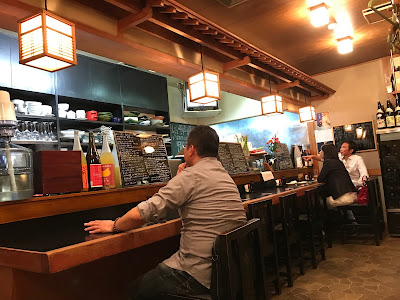Source: Photographs of the restaurant, “Tempura Yaguruma” from the photo gallery of the official website of Tempura Yaguruma(the website is available only in Japanese)
As I introduced in our last blog, I had opportunity to join a tour visiting Ichijodani Asakura Clan Ruins with the president of the Hotel Riverge Akebono, Mr. Shimizu, and the intern of the hotel, Ms. Julia Coslian, the manager of Fukui City Hospitality and Tourism Promotion Office, Mr. Takama and his staff member, Mr. Juancho Santamaria in June 2017.
Before heading to Ichijodani Asakura Clans Ruins, we had lunch at the tempura restaurant, "Tempura Yaguruma" (the website is available only in Japanese) which is a popular tempura restaurants in Fukui.
Source: Photographs of the restaurant, from the photo gallery of the official website of Tempura Yaguruma(the website is available only in Japanese)
At “Tempura Yaguruma”, you can enjoy watching the traditional Japanese garden with a small waterfall, and the Japanese chef cooking tempura in front of you while you are eating.
There were many foods on the menu that all looked delicious so we couldn’t decide what to order. Mr. Shimizu suggested we order their special lunch combos.
Shortly after we ordered, a lady who works at the restaurant started serving our meals with a lovely and polite smile. First, Miso soup (the taste of the soup was amazing) then, Japanese pickled vegetables and freshly cooked rice were served. It was free refills on the rice. Following that, the tempura was served, which was cooked in the middle of the restaurant where everyone could see the chef prepare it.
As the chef finished cooking, the freshly made tempura, which was crispy and hot, was served for each of us. I loved the crispness of the vegetable, fish and shrimp tempura. The lunch combos were quite substantial. I would like to suggest this lunch combo to people who visit Fukui.
The condiments (or you may call it toppings) are a small plate of grated radish and chopped Welsh onions that are served with the tempura. We call it “Yakumi” and it can be added to your soup or tempura depending on your preference.
Source: dremstime, HOW TO USE CHOPSTICKS
I was amazed by how Julia and Juancho were using chopsticks skillfully and enjoying every meal without any problem. I realized that it is common for people from outside of Asia to be able to use chopsticks well these days.
Source: Photographs of the restaurant, from the photo gallery of the official website of Tempura Yaguruma(the website is available only in Japanese)
Julia and Juancho seemed impressed by the meal and the traditional Japanese garden at the restaurant.
Source: Japanzine Japan’s Must-Read Mgazine, Chopstick Crimes
Source: Hugh FoxⅢ Multicultural Lessons, Japan
To be able to eat Japanese food in the traditional way, there are many rules and manners one must know. Even some Japanese people find following the rules perfectly a challenge. Julia found it difficult as well. She said that because there is a certain order and etiquette when eating traditional Japanese food, she must watch others to enjoy it to learn properly.
As a Japanese person, I thought I knew how to have traditional Japanese food properly, but I realized that there are rules and manners I am still unsure about such as the order in which to eat, how to hold the bowl for miso soup and everything in between. I would like to properly learn it again to be able to teach others, especially from overseas, the rules, etiquette and the beauty of Japanese food.
Stay tuned for the next blog!
T.F
You can see some tourist attractions and the directions to these places from the webpage, "Hotel Reiverge Akebono, Tourist attractions around our hotel".
Made by Julia during her internship, this webpage has directions that are easy to follow.
She researched these tourist attractions, before visiting them and experiencing
the charms of Fukui herself. I'm sure that this map will help you get around easier.
There is also a Japanese version of this webpage(only available in Japanese).
However, some of the places which are introduced on the Japanese webpage
are different to the English version that Julia made.


































